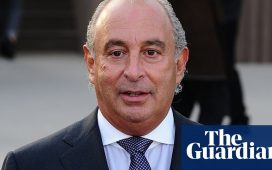Unlock the Editor’s Digest for free
Roula Khalaf, Editor of the FT, selects her favourite stories in this weekly newsletter.
In 1976, the then prime minister James Callaghan delivered an uncompromising message to the Labour party conference. “We used to think that you could spend your way out of a recession, and increase employment by cutting taxes and boosting government spending,” he warned. “I tell you in all candour that option no longer exists.”
This passage calling time on the postwar consensus was written by Callaghan’s son-in-law, Peter Jay, who was then economics editor of The Times, a position he’d occupied since 1967.
In his early days at The Times, Jay, who has died at the age of 87, was a vocal advocate of the devaluation of the pound. He regarded the old sterling exchange rate with the dollar as a “primitive bauble” that Britain ought to surrender if it was to have any hope of improving economic growth.
After a visit to the US in the early 1970s, he fell under the spell of free-market economists such as Milton Friedman, and subsequently became, along with his great friend the Financial Times columnist Samuel Brittan, one of the leading British proponents of monetarism. He took some credit for helping to precipitate a “kind of fundamental crisis in the assumptions on which economic policy had been up until then largely conducted”.
Peter Jay was born in February 1937 into the bosom of the London Labour intelligentsia. His father Douglas was a journalist, civil servant and politician who served under both Clement Attlee and Harold Wilson. His mother, Peggy, was a Labour member of the London County Council, dubbed by a local newspaper the “uncrowned queen of Hampstead”.
Like his father, Jay was educated at Winchester and Oxford. Academic life was a succession of prizes. “I was one of those people who always found it great fun to compete,” he said. Indeed, such was his success that at Oxford he was pronounced the “cleverest young man in England”, to which his response was: “Is there someone cleverer in Wales?”
While at Oxford he met Margaret Callaghan, whom he married in 1961. They had three children. After graduating, he sat and failed the entrance exam to All Souls before eventually joining the Treasury, largely, he confessed, to get his father “off my back”.
A chance conversation with a BBC journalist at a New Year’s Eve party in 1966 led to the editor of The Times, William Rees-Mogg, offering him the job of economics editor. He would earn some notoriety there when a bemused subeditor protested that he didn’t understand an article of his. Jay replied: “It’s not intended to be understood by people like you. It’s only intended to be understood by three people, two of whom are in the Treasury and one of whom is in the Bank of England.”
During his period at The Times, Jay also worked as a presenter for London Weekend Television, where he met John Birt, who would later become director-general of the BBC. He and Birt developed an influential critique of the state of current affairs television and what they regarded as its “bias against understanding”.

In 1977, Jay’s already “sinuous” career took a remarkable turn when — at the instigation of the foreign secretary, David Owen, and not, as many assumed, his father-in-law — he was appointed Britain’s ambassador to the US, despite his relative youth (he was just 40) and his total lack of diplomatic experience.
His two-year stint in Washington was most notable for the beginning of the end of his marriage, after Margaret had an affair with the journalist Carl Bernstein, an episode later lightly fictionalised by Bernstein’s wife Nora Ephron in her novel Heartburn. Jay, meanwhile, was sleeping with the embassy nanny, who became pregnant. He initially contested paternity of the child she bore but was ultimately shown to be the father. The Jays eventually divorced and he was married a second time, to Emma Thornton, a designer of garden furniture.
Back in the UK, Jay ricocheted from job to job. He led the consortium that won the independent breakfast television franchise, and in 1986 became chief of staff to the corrupt publishing tycoon Robert Maxwell. It was an unforgiving role in which he was “responsible for everything and in charge of nothing”, but he needed the money. Birt came to his rescue in 1990, appointing him economics and business editor of the BBC.
Arriving in Washington, it turned out, had been the high point of his career. “There’s a sense in which, after the embassy, I ceased to have any feeling of a career or a trajectory,” he admitted. “I thereafter thought of all my working activities as a kind of epilogue.”











